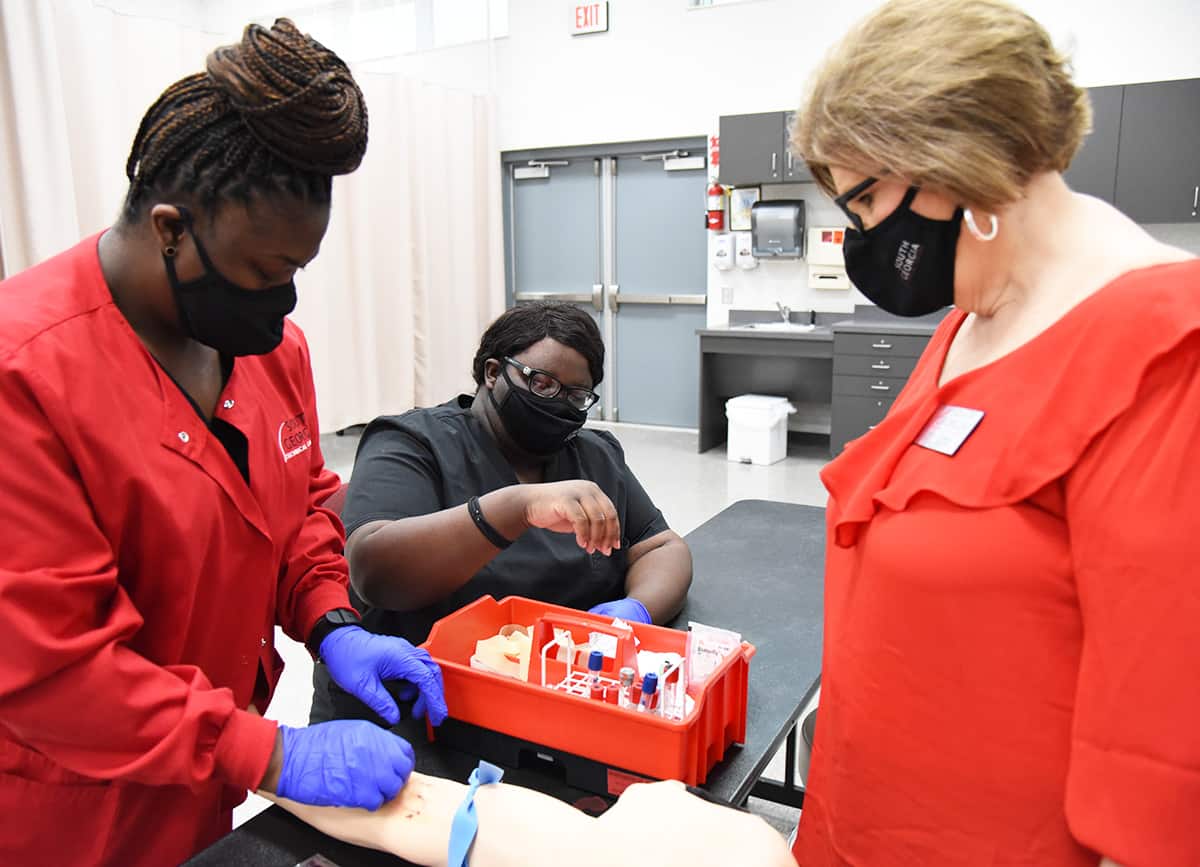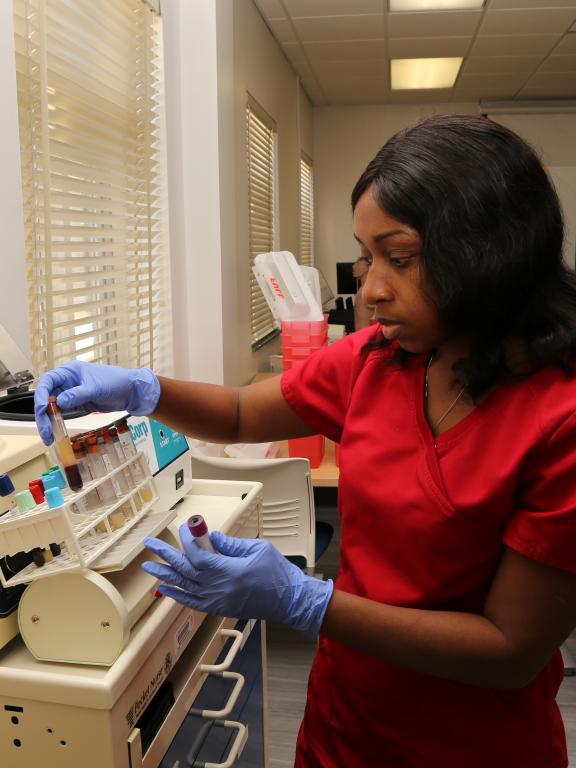Essential Abilities You’ll Learn in a Phlebotomy school
Wiki Article
The Course to Accreditation: Comprehending the Phlebotomy Educating Program Trip and Its Value
As you take into consideration the course to qualification in phlebotomy, it is necessary to recognize the duty you'll play in medical care. Your training will certainly cover crucial abilities, from blood collection strategies to patient communication. Each element of the program prepares you for the obstacles in advance. However exactly what does the journey involve, and why is certification so essential for your future career? Let's explore these questions further.
The Function of Phlebotomists in Health Care
Phlebotomists play an essential duty in the medical care system, working as the crucial web link between individuals and vital analysis screening. You'll perform blood draws, ensuring examples are gathered accurately and securely. Your proficiency helps in detecting clinical conditions, keeping track of wellness, and directing therapy decisions.In your everyday interactions, you'll require to establish trust fund with individuals, making them feel comfy throughout what could be a difficult experience. You are in charge of labeling and managing samples very carefully to stop contamination or mistakes, which can influence examination outcomes.
Past this, you'll usually work together with medical professionals and nurses, communicating crucial information about individuals' problems. By mastering your abilities, you add meaningfully to client treatment, making you an indispensable component of the medical team.
Introduction of Phlebotomy Training Programs
When discovering phlebotomy training programs, you'll discover various types developed to fit different routines and learning designs. Each program assists you develop necessary skills like blood collection and patient communication. Recognizing these choices is crucial to choosing the ideal course for your occupation.Kinds Of Educating Programs
Several sorts of training programs are available for those seeking to end up being skillful in phlebotomy. You can pick from certification programs, which usually last a few months and concentrate on crucial skills. There are also diploma programs that give an even more detailed education and learning, often lasting approximately a year. If you're seeking a deeper understanding, an associate degree in a related area could be the best fit. On-line training courses supply versatility for those stabilizing work or family members commitments, allowing you to study at your own rate. Furthermore, some health centers and clinics provide on-the-job training programs, giving practical experience while you find out. Whatever course you pick, each program aims to outfit you with the needed skills for an effective phlebotomy job.
Secret Abilities Established
Understanding phlebotomy calls for a set of key abilities that are created via comprehensive training programs. In addition, communication skills are basic; you'll need to interact with patients, discuss procedures, and placed them at convenience. Each of these abilities is important for your success as a licensed phlebotomist, making you a beneficial property in any medical care setup.Key Elements of a Phlebotomy Course
In a phlebotomy training course, you'll concentrate on essential subjects that lay the groundwork for your future job. You'll participate in hands-on training that allows you to use what you have actually found out in real-world settings. Both the core educational program and sensible experience are essential for your success as a phlebotomist.Curriculum Overview
While seeking a phlebotomy training course, you'll encounter a core educational program developed to outfit you with fundamental abilities and understanding. Phlebotomy school. This curriculum commonly consists of composition and physiology, focusing on the circulatory system and understanding blood parts. You'll additionally find out about various sorts of blood collection methods, including venipuncture and capillary slit methodsFurthermore, infection control and safety and security protocols are vital parts, guaranteeing you know how to maintain a clean and sterile atmosphere. You'll research patient communication, stressing interaction and compassion, which are essential for alleviating client anxiety. Lastly, moral and lawful factors to consider will certainly be resolved, preparing you for real-world duties. This fundamental understanding will allow you to excel as a phlebotomist and provide high quality treatment in professional setups.
Hands-On Training Experience
Getting hands-on experience is a crucial component of your phlebotomy training program. This sensible training allows you to apply what you have actually found out in a real-world setup, enhancing your skills and confidence. Phlebotomy Classes Near Me.Additionally, you'll obtain the possibility to communicate with people, which is essential for establishing your communication skills. This mix of technical efficiency and social skills is critical for your success as a qualified phlebotomist. Inevitably, hands-on training is where concept satisfies technique, strengthening your knowledge and preparedness for qualification.
Certification and Licensing Needs
Before you can begin your job in phlebotomy, it is vital to recognize the accreditation and licensing needs that differ by state. The majority of states require phlebotomists to hold a qualification from an acknowledged company, such as the National Phlebotomy Association or the American Culture for Professional Pathology. These qualifications normally include passing an examination that evaluates your knowledge and abilities in the area.Along with accreditation, some states have particular licensing needs. You might require to finish a specific number of hours in professional technique, send proof of training, or go through a background check. It is necessary to investigate your state's laws to ensure you satisfy all needed requirements.
Remaining notified concerning these demands not just helps you protect a position yet also improves your reliability as a specialist. By fulfilling these demands, you'll be well on your means to a successful job in phlebotomy.
Hands-On Training and Practical Experience
Hands-on training and useful experience are crucial elements of your phlebotomy education, as they permit you to apply academic knowledge in real-world circumstances. During your training, you'll participate in monitored venipuncture, discover proper methods, and Phlebotomy Classes Near Me come to be accustomed to various blood collection tools. This straight participation is important for developing your confidence and refining your skills.You'll work very closely with skilled specialists who can guide you via the nuances of person interaction and example handling. Each technique session not only enhances your understanding yet also prepares you for the busy atmosphere of medical care settings.
Furthermore, lots of programs integrate professional turnings, enabling you to experience varied settings, from hospitals to outpatient facilities. This direct exposure aids you adapt to different obstacles and client demands, ensuring you're well-prepared for your future function. Accept these possibilities, as they're vital to coming to be a skilled and caring phlebotomist.
Difficulties Encountered Throughout Training
While getting hands-on experience is essential, it's crucial to recognize the challenges that can emerge throughout your phlebotomy training. In addition, mastering the abilities required for blood attracts takes technique; you might struggle with technique originally.Time monitoring can also be a difficulty, as harmonizing theory, sensible sessions, and personal dedications can feel daunting. You might encounter differing finding out speeds among your peers, resulting in sensations of insecurity if you believe you're falling behind. Adjusting to the various individualities of teachers can be tough, as each may have a distinct teaching design.
Acknowledging these barriers at an early stage can prepare you for success and aid you create strength throughout your training journey.
Job Opportunities After Accreditation

As you get experience, you may even consider concentrating on locations like pediatric or geriatric phlebotomy, dealing with specific patient demands. Some phlebotomists pick to advance their jobs by becoming laboratory specialists or going after further education in health care areas.
Additionally, your certification can lead to functions in training or supervising brand-new phlebotomists, allowing you to share your knowledge. With the medical care sector continually expanding, your abilities will constantly remain in need, paving the means for a stable and satisfying occupation. Embrace the possibilities waiting for you!
Often Asked Concerns
What Is the Normal Period of a Phlebotomy Training Training Course?
Phlebotomy training programs generally last around four to eight weeks. You'll engage in hands-on practice, classroom direction, and on-line understanding. Completing this training prepares you for certification and a satisfying occupation in health care.Are Online Phlebotomy Courses Available?
Yes, on-line phlebotomy programs are available. They provide adaptability and comfort, allowing you to research at your own rate. Just confirm the program is recognized to fulfill accreditation requirements and get valuable skills for your job.How Much Does Phlebotomy Training Usually Expense?
Phlebotomy training commonly sets you back between $700 and $2,500, depending on the program and location. You must think about factors like course size, consisted of products, and hands-on experience when choosing the right training for you.What Are Typical Requirements for Phlebotomy Training?
Common prerequisites for phlebotomy training typically include a high institution diploma or GED, immunizations, and a history check. Some programs might also require basic health care knowledge or certifications, ensuring you're planned for hands-on training.Can I Work While Finishing My Phlebotomy Training?
Yes, you can work while completing your phlebotomy training. Several pupils equilibrium tasks with their researches, however ensure to manage your time successfully to assure you meet both work and training commitments effectively.Report this wiki page